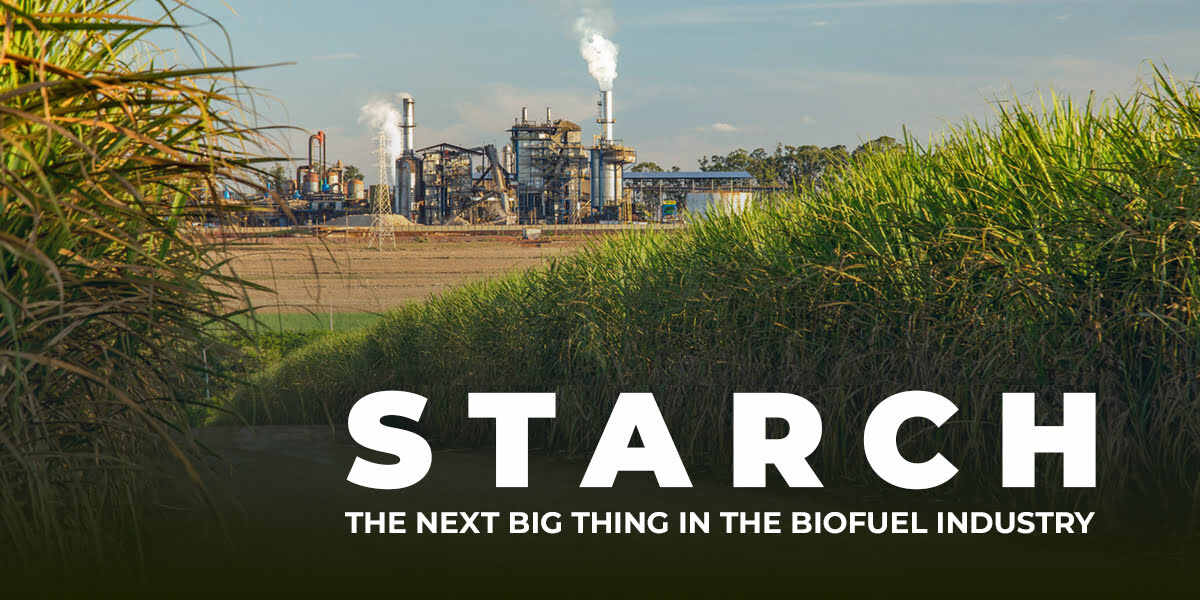Starch-based feedstocks encompass grains like corn and wheat and tubers such as (sweet) potatoes and cassava. These feedstocks are rich in intricate chains of sugar molecules, making them readily convertible into fermentable sugars. These sugars can then undergo conversion into ethanol or drop-in fuels. Also, the fibrous components of these plants, such as wheat straw or corn stover, hold the potential for transformation into advanced Biofuel Industry, as seen in the case of cellulosic ethanol production.
Biofuel Industry are a never-ending, environmentally friendly fuel derived from Biomass.
Biofuels are viewed as clean and among the most readily accessible fuels globally. They are sourced from biomass like wood and straw, achieved through the direct burning of dry matter, transforming into gaseous or liquid fuel. Other origins encompass organic materials such as sludge, sewage, and vegetable oils, which can be transformed into biofuels through a wet process like digestion and fermentation.
Types of Biofuel Industry
Biofuels are widely accessible across the globe and typically include the following fuel types:
- Biodiesel
- Bioethanol
- Bioethanol
Among these, bioethanol and biodiesel stand out as the most prevailing types of biofuels currently used, representing the first generation of biofuel technology.
Generations and Promising Sources Of Biofuel Production from Plant Resources
The generation of biofuel from botanical resources involves using materials like timber, straw and household refuse to generate heat and power. Also, biofuels can be derived from animal fats, botanical byproducts, and various organic waste materials from living organisms.
This progression is categorised into three distinct types:
- First-generation: Biofuels primarily originate from consumable sources like sugar, starch, and other food crops cultivated on arable land.
- Second generation: Biofuels are produced using non-edible plant substances, including dry plant matter, woody biomass, agricultural remains and detritus.
- Third generation: Biofuels predominantly stem from algae and microorganisms, known for their high yield potential.
Also, the jatropha, belonging to the spurge family and containing a genus of flowering plants, is a notable biofuel industry across various global regions.
The Biofuel Production Process
Phase 1:
Carefully selected plant crops are allowed to bask openly under the sun’s warmth.
Phase 2:
Subsequently, these cultivated crops undergo thorough refining procedures within factory settings to yield various food products.
Phase 3:
Following the creation of food products, these crops are again subjected to refinement geared towards biofuel production.
Phase 4:
Upon the successful generation of biofuels, they are meticulously gathered into storage tanks and readied for subsequent processes.
The biomass or raw materials used for crafting biofuels include:
- Grain starch for bioethanol production: Comprising crops such as corn and wheat.
- Sugar crops for bioethanol production: Including sugarcane and sugar beets.
- Oilseed crops for biodiesel production: Encompassing soybeans, rapeseeds, palm oil, cooking oil, and various tropical oilseeds.
Also, cellulosic biomass serves as a crucial resource for bioethanol production and includes:
- Residues from forests.
- Municipal solid waste.
- Managed biomass, which incorporates trees and grass.
- Crop remnants include corn stover, wheat straw, rice straw, and sugarcane bagasse.
Advantages of Biofuel
- Promotes public health by reducing toxic emissions.
- Contributes to a cleaner environment.
- Eliminates hazardous gases like Carbon Monoxide (CO) and Sulphur Oxide (SO) emissions.
- Reduces the risk of cancer and respiratory issues in humans due to non-toxic emissions.
- Mitigates the threat of global warming, making it eco-friendly.
Disadvantages of Biofuel
- Disruption of natural life cycles.
- High labour costs and significant storage space requirements.
- Increased water consumption, particularly in arid regions.
- Elevated demand for agricultural land when cultivating biomass for biofuel production.
The Rationale for Biofuel Adoption
Biofuels present various advantages and drawbacks concerning their impact on environmental, economic, and social sustainability. Globally, the foremost biofuel drivers revolve around reducing greenhouse gas (GHG) emissions, bolstering energy security by decreasing crude oil imports and fostering rural development. These same advantages align with the findings of the Niti Aayog report, encompassing enhanced energy security through potential crude oil import reductions, increased engagement of local entrepreneurs and sugarcane farmers in the energy sector and reduced vehicular emissions. While the advantages for farmers are unmistakable, as any surge in demand for crops, not limited to biofuel crops, benefits them, the energy and environmental gains are nuanced and heavily contingent on specific contexts.
Net Energy Balance
The overall energy ratio (OER), which signifies the ratio of energy delivered by a fuel (be it petroleum or biofuel) to the total energy inputs required for its production, exhibits its highest value for gasoline and its lowest for cellulosic ethanol. However, using renewable energy sources to produce biofuels results in a lower fossil energy ratio (FER), representing the ratio of liquid energy output to fossil energy input. Gasoline maintains an FER equivalent to its OER at approximately 0.8, while Brazilian sugarcane-based ethanol boasts an FER of about 10. The notably high FER for sugarcane-based ethanol can be attributed to the substantial contribution of energy from sugarcane fibre in its production process. Although specific FER estimates for Indian ethanol are unavailable, they are likely to be lower than those for Brazilian ethanol, as the latter is consistently rated as the most energy-efficient biofuel in numerous studies.
